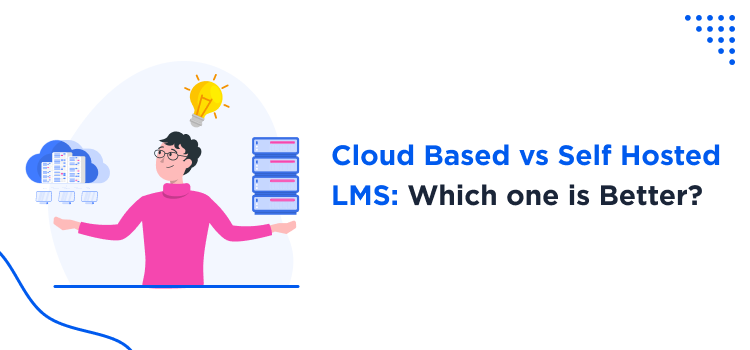Cloud Based vs Self Hosted LMS: Which One is Better?

The e-learning industry has been growing rapidly and will reach $975.2 Billion by 2031. It’s running forward like a Cheetah behind its Prey. If you want to launch an online course platform and are still confused between Cloud-based vs self-hosted LMS, then it’s time to clear it up and move forward. This is a crucial decision that will define your tasks over time.
Briefly, a cloud-based LMS is entirely managed and hosted on a third-party platform or server. You will only need the internet to access the site. On the other hand, when you completely host and maintain an LMS system on your own servers, it’s a self-hosted E-learning systems. This method gives you a lot of control but with some technical expertise.
This blog will take you through all the details of self-hosted vs cloud-based LMS and power you up to get into the business.
Understanding the Cloud-Based LMS System

When you host a Learning Management System over external servers managed by third-party providers, it’s a cloud-based LMS. Here, you are not involved in the setup and maintenance of any hardware or software device. You just have to access it all via a data connection by logging in.
The main aspect of a cloud-based system is its simplicity. Even without any technical skills, you can get started. The service provider or platform provider will take care of all the updates security, and manage the server. You just need to focus on creating a valuable learning experience and content.
These platforms have a subscription module so you opt for a monthly or yearly plan. To stay away from all the technicalities and have it all outsourced, this LMS system will work wonders for you.
Thus, with cloud based, it is fairly easy to access your courses at any time from any location. It is as easy as using a streaming platform!
Pros of Cloud LMS
- Ease of Use: Cloud-based LMS provides a high level of simplicity as there are no complicated setups to be executed from your end. You can just log in and start using the platform like any other social media platform. It is ideal for the ones who want a complete solution.
- Lower Upfront Cost: There are no large initial investments and is offered as a subscription service. The monthly or yearly flexibility of payment helps you plan your business costs efficiently.
- Automatic Updates and Maintenance: With cloud-based LMS, there’s no technical work to be managed by you. The provider will manage all your technical challenges and solve the bugs. You just focus on what you know, creating online courses.
Cons of Cloud-based LMS
- Limited Customization: You will have less flexibility and customization options with cloud-based LMS systems. Thus, if you have any specific design needs in mind, this might disappoint you. It will not scale up to your imagination and can be restrictive.
- Potential Data Security Concerns: Well, with external management, your data is also on the external servers being managed by the provider. So, there are high chance that you have limited control over what is stored and managed. You always get assured security measures with each cloud-based LMS, however, for businesses dealing with sensitive data, it might be a concern.
Understanding the Self-Hosted LMS System

Now, obviously, this system is quite the opposite. Here, you run the LMS on your server. Here, you manage the technical aspects of the system. It gives you complete control over management and decision-making. From setup to installation, maintenance, and updates, everything needs to be taken care of by you.
It might seem like a lot of tasks as compared to cloud-based systems but provides a high level of customization needed by many online coaching platforms. You can easily transform the LMS to your needs with a self-hosted version of LMS. You can modify the code, integrate plugins, choose your themes, and have a tailor-made solution.
But, with great power comes great responsibility as said by our beloved Spiderman. You will need dedicated IT support to help you manage servers and handle security. You need to keep a check for regular updates and backups as well. Without the right knowledge and guidance, the cost and complexity of building an LMS is going to skyrocket.
Thus, you must opt for the flexibility and ownership of a self-hosted LMS if you have technical know-how or a dedicated team/person for the same.
Advantages of Using Self-Hosted LMS
- Complete Control: You are the maker and the driver of your car with self-hosted LMS. You can customize it as per your imagination, add specific features, and modify the platform to suit your business needs. If you want a perfectly tailored experience, this is for you.
- Better Data Security: As the LMS is hosted on your in-house servers, you can easily control your data. Further, you can also define who has access to what. If you work with sensitive data that requires privacy, well, it’s one of the advantages of using self-hosted LMS.
Cons of Self-Hosted LMS
- Higher Upfront Costs: With this, there are a lot of initial costs like purchasing a server, software, and deploying an IT Team. This is a costly solution for small businesses run by a small team and not planning to expand anytime soon.
- Technical Expertise Required: If you are tech-savvy or can afford a techie team then only opt for self-hosted LMS. Everything from troubleshooting to software updates will be managed by you. Without that, you will be stuck solving the technical deets and will not be able to focus on running the course module.
Tabular Comparison of Cloud-Based vs Self-Hosted LMS
| Cloud-Based LMS | Self-Hosted LMS | |
|---|---|---|
| Cost Comparison | – this model offers subscription-based planning, thus, the upfront cost of running an LMS is comparatively lower. | – The upfront costs are high because of purchasing a server, opting for a hosting platform, and employing an IT professional. – Maintenance Costs are also high as you are not aware of what issues can come up. |
| Customization and Flexibility | – You often get pre-built templates to choose from with limited branding and function flexibility – There is very little scope for deep customization and tailoring completely | – You can have unlimited customization options and change anything from code to features – If you have the technical know-how, there’s no limitation to customization in any way |
| Security and Data Privacy | – You get industry-standard security protocols that are fully managed by the service provider. You do not have to worry about data, backups, updates, encryption, or anything – You have limited control over your data as it is stored in external servers | – Complete control over security and data. You can easily customize who has access to the data and ensure specific compliance – It increases your responsibility as you need to keep a constant check on backups, and updates, and stay alert to cyber threats |
| Scalability and Performance | – You can quickly scale up by adding more users, and courses, or opting for more storage. You have to be carefree about the server’s capacity and performance as the provider handles your scaling solutions – You get optimum performance as it is managed by experts on powerful optimized platforms. You get a consistent performance without any upgrades to your hardware. | – Scaling can be more complex in this model as you need to upgrade servers, buy more storage, and even redesign the platform. It takes up a lot of financial and technical resources – You need to be on your toes for all the troubleshooting and keeping track of any slowdowns. If your IT performance is good, your server’s and site’s performance will also be good |
| User-Friendliness | – This is the most user-friendly solution as it gives you everything on a plate. You just need to focus on your work without worrying about any backstage drama – You also need not install any software or configure any servers as everything is hosted online | – You get more control but with complexity. It requires a lot of installation, configuration, and maintenance – Without technical expertise or an in-house IT team, it’s almost impossible to sustain the self-hosted LMS system |
Which One is Right for Your Business?

As you might have understood, both methods of setting up an LMS are beneficial and profitable. The decision purely depends on what are the needs of your business and what’s the affordable budget. Having a clear understanding of both will help you pick the right one.
Choose a Cloud-Based LMS If:
- You want an easy to use solution without any technical issues or management. If you want your LMS up and running in no time, cloud-based is your answer.
- You need to scale up rapidly. Cloud-based systems are supportive of fast-growing businesses and require minimal setup to scale up.
- You require a specific cost that can help you in budgeting. With cloud-based LMS, you get a predictable amount of expense and a list of all the features that are included. This aids in the overall budgeting and planning of your business.
Choose a Self-Hosted LMS If:
- You want the power of customization. If you want your LMS to be tailor-made for you, opt for self-hosted LMS. It will provide you with all the flexibility you need to modify your online membership business.
- You have the technical prowess. If your technical skills or IT team are on point, a self-hosted LMS will be a very effective solution.
- You are planning for long-term efficiency in cost. The initial costs and setup are very high for a self-hosted LMS system. However, in the long term, it is cost-effective when you manage a huge number of users and courses.
Wrapping up the LMS Comparison
We know you know the answer to your confusion now. The ARMember Online Course add-on is a perfect solution for you if you want to opt for a self-hosted platform with full support from the developer team. It is easy, intuitive, and seamless to set up!
Read More Insights here:





Leave a Reply
You must be logged in to post a comment.